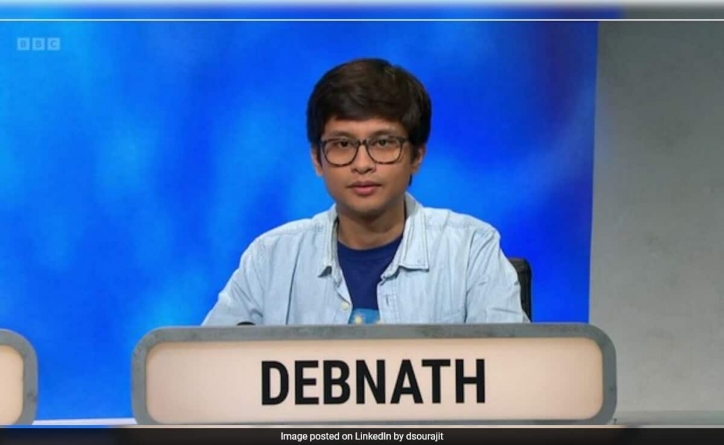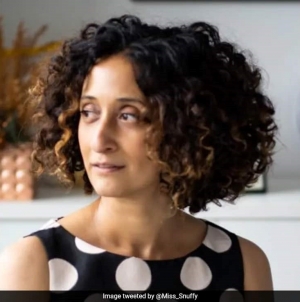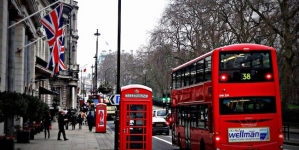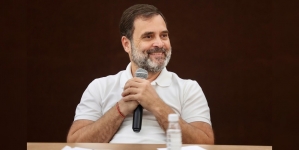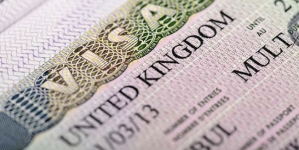-
LONDON: Run For Modi” Event In London To Drum Up Support For PM Modi - 13 hours ago
-
LONDON: Indian-Origin Candidate On How He Plans To Win London Mayoral Polls - 2 days ago
-
HARVARD: No Country Is Perfect”: Physics Wallah Urges Indian Students At Harvard, Stanford To Return - April 27, 2024
-
CALIFORNIA: PM Modi Put India On World Map As Credible Innovator- IT Industry Leaders - April 26, 2024
-
WASHINGTON: Indian Students Bag NASA Awards For Human Exploration Rover Challenge - April 25, 2024
-
LONDON: Indian-Origin Teen In UK Gets “Life-Changing” Cancer Treatment - April 25, 2024
-
SILICON VALLEY: All About Pavan Davuluri, New Head Of Microsoft Windows - April 25, 2024
-
LONDON: UK’s India Gate To Commemorate Role Of Indian Soldiers From World Wars - April 24, 2024
-
HARARE: Shri Bramha Kumar appointed as the next Ambassador of India to the Republic of Zimbabwe - April 23, 2024
-
LONDON: Indian-Origin Principal Wins UK Legal Challenge Over School Prayer Ban - April 23, 2024
LONDON: Chandrayaan-2 Team Member Wins UK’s Toughest TV Quiz
LONDON: The Imperial College London quiz team which included computational science graduate from Kolkata Sourajit Debnath has emerged the winner of the champion’s trophy of ‘University Challenge’, dubbed television’s toughest quiz tournament in the UK.
The 31-year-old who answered several challenging questions in the final paid testament to Imperial’s Quiz Society and the “unparallelled mentorship” from previous teams as contributing factors in this year’s victory with an impressive margin. The win in Monday night’s final aired on BBC makes the London-based university one of the most successful in the show’s history, winning the coveted trophy for the fifth time – the last time being in 2022.
“I feel elated to be a part of British quizzing history and grateful that our team had the opportunity to clinch the title while representing Imperial,” said Debnath.
Amol Rajan, the British Indian presenter who hosts the popular BBC programme, described Imperial’s victory as “remarkable”.
The team were awarded the ‘University Challenge’ trophy by host Amol Rajan and acclaimed playwright Sir Tom Stoppard at an event at Imperial College London’s South Kensington Campus.
“Imperial’s diverse international community is used to finding the answers to really tough questions, whether that’s in the lab or on University Challenge. I’m really proud of our winning team,” said Imperial’s Provost Professor Ian Walmsley.
“Their breadth of knowledge well beyond science is truly impressive, and their disciplined approach to the quiz has made history for Imperial as University Challenge’s most successful team,” he said.
In preparation for the challenge, the team spent months revising their specialist subjects and practising quizzes as a close-knit group. Team captain Suraiya Haddad said: “I’m thrilled to have captained Imperial College London to its fifth historic win, making us the institution with the most wins in the history of the programme. We have all worked incredibly hard and done Imperial proud. “All of us were balancing our degrees with our exams, in my case my finals. We were up against fantastic opposition with UCL [University College London] who played brilliantly throughout the series. The level of support we have received from the Imperial community and beyond has been amazing, thank you to everyone who has been cheering us on!” Imperial’s team has excelled this year in rounds on a diverse range of topics, including classical sculpture, European history, Korean mythology and mathematics. To reach this year’s finals, the team beat Trinity College, the University of Cambridge, in the semi-finals and overcame other teams including the University of Manchester and the University of Sheffield.
“Imperial’s team is unusually well-rounded this year and each teammate has their own selection of niches, or specialisms to borrow from quiz parlance. All other things being equal, I’m responsible for covering maths, physics, and general science, along with pop culture on the humanities side,” Debnath had shared ahead of the final this week.
Debnath has completed a Master’s in Applied Computational Science and Engineering at the Department of Earth Science and Engineering at Imperial College London, a degree he chose to pivot to a career in computational science.
In India, he was a space scientist at U R Rao Space Centre, the spacecraft-making arm of the Indian Space Research Organisation (ISRO), where he worked on the 2019 Indian lunar lander/rover mission Chandrayaan-2, among other spacecraft. After his graduation from Imperial College London, he joined an Imperial start-up focused on geophysics algorithms operating out of the university’s Royal School of Mines.
Imperial College London said its success is built in part on the expertise of previous teams, as representatives from past seasons take part in Imperial’s mentoring programme for the competition. Contestants are selected by a University Challenge committee made up of previous contestants, who then coach the team on how to revise for different topics and maximise their ability to answer questions quickly.



















